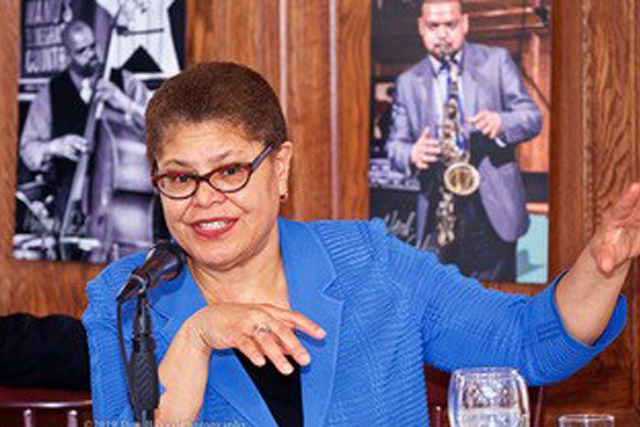‘You Pitch Stories and They Won’t Put You On’
What Blacks Have Already Lost Under Trump
Blacks, Latinos Are Top Groups Nixing Trump
Greenwald Says Media Spread U.S. Lie on Venezuela
Where Are Black and Brown People in Stock Photos?
1619, When the First Africans Reached Virginia
Short Takes: Youth of color in prison; Dow Jones News Fund; Cedar Attanasio; Priscilla Villarreal; diversity at Paramount Pictures; Al Roker
Homepage photo: Rep. Karen Bass at Journal-isms Roundtable, by Don Baker Photography
Originally published March 12, 2019
Support Journal-ismsThirty-eight people attended the Journal-isms Roundtable. (Video by Janice Temple)
‘You Pitch Stories and They Won’t Put You On’
The Congressional Black Caucus consists of the nation’s highest-ranked elected black officials, but Americans would not know that from the indifference their group receives from the nation’s media (video), Rep. Karen Bass, D-Calif., the new caucus chair, told Washington journalists on Sunday.
So the Caucus wants to do an end run around the media and is planning group trips around the country to meet with its publics. And Bass said the Caucus also wants closer ties with black journalists. “My goal is that by December 2020 for black America to know what the Black Caucus does, and for the Black Caucus to demonstrate how we use our power to impact the daily lives of African Americans and everybody in the United States,” she said.
“One of the things that we’re doing is my request for coverage because I enjoy the press, you know,” the five-term member of Congress told 38 attendees of Sunday’s Journal-isms Roundtable. “I’m a news junkie and I like doing it, but we can’t get coverage. The TV — print is a little different, but not much. ‘’Cause you call up and pitch stories and they won’t put you on. They’ll put on the same five white guys every single day, and you would have no idea there’s 55 members of Congress [in the Caucus] — so what we plan to do is, we plan to go en masse — once a month to members’ districts and to have the community see us in our formal roles.”
The 55 members of Congress represent the Caucus’ largest membership since its founding in 1974. They are 20 percent of the 235 Democrats who are the House majority, and, when their numbers are added to Hispanic and Asian caucus members, represent 128 of those Democrats, Bass said. And yet, too many people don’t know what exactly the Black Caucus does.
“So for an example . . . March 29 and 30, we’re going to be in Detroit, but to give you an example, in Los Angeles, I would chair in my official capacity the crime subcommittee. People in the community would have an opportunity to see me chairing the committee, with Republicans on the committee, non-African Americans on the committee. After that, CBC members would descend on Los Angeles en masse, we would meet with the local elected officials, local media, we’ll meet with clergy, we’ll do site visits, and then do a lot of social media, and other media, so that people across the country will see us. But every month, we want to be in a different geographic area, and maybe it won’t be an area where there is a member of the Congressional Black Caucus, but [where] there’s a significant African American population.”
Part of the outreach involves black journalists, she said.
“I think we should do weekly, or every other week, phone calls with you. You should know what is happening in Congress,” Bass said. “We’re on every committee; I can list the five committees that we’re in charge of. I can give you the inside story of what is going on, and we would like to have that kind of relationship with you, so I just wanted to ask for your help, and I also wanted to say that we will be there to help you as well. . . .”
The lack of diversity on the Sunday talk shows has been a sore point for years. In 2005, the National Urban League released a report, “Sunday Morning Apartheid.” The dissatisfaction was aired most effectively in 2010, when NBC’s proposed absorption into Comcast was up for federal approval.
“A day after a scolding from black members of Congress about NBC’s insufficient diversity, the network Friday declared that ‘from interviews with political newsmakers to our roundtable discussions, ‘Meet the Press’ is committed to having a more diverse group of voices on the show whose opinions and expertise reflect, not just the news of the day, but the cultural, economical and political landscape of our country,’ ” this column reported at the time. Comcast won its approval for the merger.
Yet while the numbers of African Americans and others of color on the Sunday shows has increased, black members of Congress have generally not been the beneficiaries.
As Bass outlined on Sunday, they have distinct perspectives on the policy issues of the day and, as part of the new House Democratic majority, are in a position to influence them.
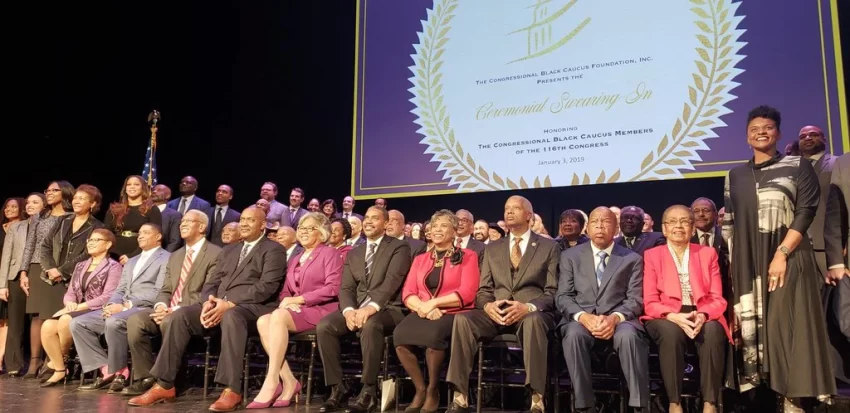
The Congressional Black Caucus now has 55 members. (Credit: Because of Them We Can; credit: via Tom Perez)
Asked about the Trump administration’s effect on their constituents, Bass cited an “assault on civil rights,” reversal of consent decrees that were reached with police departments during the Obama administration, and retrenchment on environmental protections, which particularly affects blacks, as in Flint, Mich., among other items.
During a recent retreat, Bass said, some members casually mentioned they had secured $15 million in an agriculture bill for scholarships for historically black colleges and universities. “There’s no major piece of legislation that the Black Caucus has not had impact on, whether you are talking about the Affordable Care Act and all of the legislation related to disparities in health,” or the 2010 Dodd-Frank legislation, which has been described as “the toughened regulatory regime put in place to prevent the nation’s biggest banks from engaging in risky behavior.”
A poll commissioned by the Caucus found that African Americans ranked “wealth creation” as their top issue, not surprising given the disproportionate loss of black home ownership during the Great Recession of the early Obama years, she said.
Bass also argued that immigration is good for black and Latino communities because that is the main way their numbers will grow, and she said she would introduce legislation to award damages to those affected by family separations at the border, “because the separation of these children will create lifelong emotional and psychological problems.” Though they are not publicized very much, “thousands” of black people are among those migrants, Bass said.
“Some of those children, they’re never going to see their parents again . . .” The government will “terminate their parental rights and put them up for adoption. One of the main issues I work on, by the way, is the nation’s foster care system, because the majority of kids in foster care are our kids. It’s the feeder system to the prison system,” she said.
Dorothy Tucker, a reporter at WBBM-TV in Chicago and vice president of broadcast for the National Association of Black Journalists, told Bass to be sure that Caucus members reach out to NABJ chapters when they visit the various cities, and that they exchange cell phone numbers, “because it’s all about relationships. . . . So that when something is going on, sometimes what we want is the first story. We want to break the story. So if you call us as opposed to calling the other people . . . ”
- Manny Fernandez, New York Times: ‘You Have to Pay With Your Body’: The Hidden Nightmare of Sexual Violence on the Border (March 3)
- Michael Livingston, Los Angeles Wave: Voter, justice reform among CBC’s top goals: Bass (March 4)
- Monique Q. Madan, Miami Herald: ‘I haven’t seen my parents in years’: Miami film exposes pain of family separations (March 4)
- Elias Meseret, Associated Press: 1st US congressional delegation in 14 years visits Eritrea (March 4)

Lana Marks, nominee for U.S. ambassador to South Africa and handbag entrepreneur. (Credit: Africa News)
What Blacks Have Already Lost Under Trump
When candidate Donald Trump appealed for African American votes in the 2016 campaign, he famously asked, “What the hell do you have to lose?”
According to Rep. Karen Bass, D-Calif., and chair of the Congressional Black Caucus, blacks have ruefully found out under now–-President Trump, to their detriment.
What have African Americans lost? “Off the top of my head,” she said, answering a question at Sunday’s Journal-isms Roundtable from Lottie Joiner, editor of the NAACP’s Crisis magazine. “Essentially, the assault on civil rights.
“Almost every cabinet secretary that he appointed, he gave them a mission of destroying and dismantling this agency that they were in charge of. And most of those agencies have civil rights areas. So you’re talking about education, you’re talking about the Environmental Protection Agency, if you’re talking about Health and Human Services, if you’re talking about the Department of Justice. So it’s the elimination, or the watering down, of civil rights protections across the board.
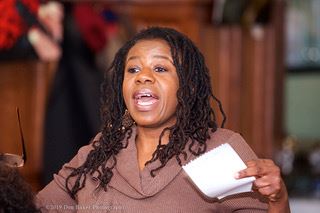
Lottie Joiner at the Journal-isms Roundtable (Credit: Don Baker Photography)
“One of the things he did right away, within a couple of weeks of being sworn in, was to reverse the consent decrees from police departments . . . . All of the voter suppression stuff that’s just been allowed to run amok. I could certainly get you more specific information, but that is a general way of looking at it. So environmental protection is huge in our communities, because you can go back to the Flint water [crisis], but loosening up regulations when it comes to the environment disproportionately impacts our neighborhoods.
“For example, in Los Angeles, this might be a little different now, but a few years ago, the leading cause of death of black children was asthma,” she continued. “Asthma, why? Because they live near freeways. It was the toxins in the air.
“And then when cap and trade kind of came in, which was meant to help the environment, you know that part of the way that works is, if I’m a polluter, then I put in money to allow myself to continue polluting, by buying trees someplace else. . . .
“So even in an environmentally aggressive state like California, you still have disproportionate impacts on communities of color. In the Central Valley in California, which is predominantly Latino, There’s a really high miscarriage rate. Why? Because of chemicals in the water. So when he reduces regulations in those areas, then it disproportionately impacts [residents] . . .
“And then in immigration, of course, there was that story [about a woman in the United States for more than 20 years] . . . her country was Liberia, which she lived in as a little kid, and now he’s getting ready to kick out 800 Liberians; and then there are the Haitians that have been kicked out. . . .”
There is also Lana Marks, Trump’s choice for ambassador to South Africa. Bass said, “. . . Trump appointed a woman to be ambassador to South Africa, and I believe her primary reason for being there is that she is a dues-paying member of Mar-a-Lago. She is, and this is the height of insult, a white South African.
“And professionally she is known for making purses. She sells purses. I’m not sure if anybody in the room can afford her purses. They cost $10-$15,000. That’s who we’ve appointed to South Africa, and that’s really significant, because can you imagine the message that sends to the South Africans?”
Yet there might be a silver lining amid the negativity. “One of the things that I hope will be said about this time period is that he was the catalyst for an awful amount of activism. . . . We recognized that he was so horrific that we [can] never relax again and have to be involved. . . . You make us mad, you make us vote.”
- Lynsey Chutel, Quartz Africa: Trump’s ambassador pick for South Africa shows how disconnected the two countries are (Feb. 8)
- Tish Durkin, New York: Talking With Ambassador Nominee Lana Marks, Who’s Ready to Ditch Palm Beach for Pretoria (Feb. 3)
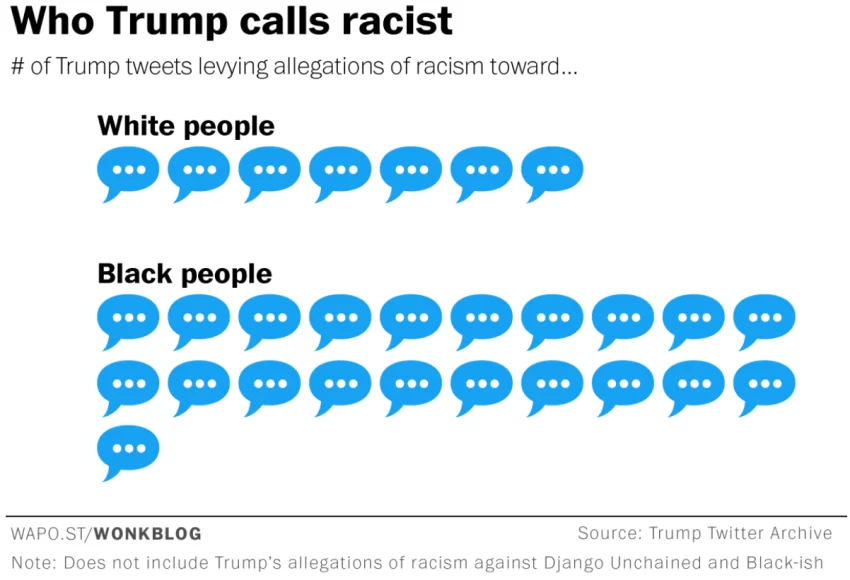
(Credit: Trump Twitter Archive via Washington Post)
Blacks, Latinos Are Top Groups Nixing Trump
African Americans and Latinos are the top demographic groups disapproving of President Trump, according to an NBC/Wall Street Journal poll released last week.
A separate poll, also released last week, found that “Three weeks after launching his presidential campaign, Vermont Sen. Bernie Sanders is leading all other announced candidates in support from black voters . . . . The only potential candidate who polled better with African-Americans than Sanders, according to the poll by Morning Consult, is former Vice President Joe Biden, who has not announced a campaign,” Ryan Grim reported March 6 for the Intercept.
In the NBC/Wall Street Journal survey, “The top groups approving of Trump: Republicans (88 percent), rural residents (60 percent), whites without college degrees (60 percent), men (54 percent) and whites overall (54 percent).
“The top groups disapproving: African Americans (88 percent), Latinos (64 percent), women (61 percent), those ages 18-34 (57 percent), whites with college degrees (55 percent) and independents (51 percent). . . .”
That poll also tested 11 different presidential characteristics, Mark Murray reported for the two news organizations conducting the poll.
“The most popular: An African American (a combined 87 percent of all voters say they are ‘enthusiastic’ or ‘comfortable’ with that characteristic), a white man (86 percent), a woman (84 percent), and someone who is gay or lesbian (68 percent — up from 43 percent in 2006).
“The least popular: A Muslim (49 percent are enthusiastic or comfortable — up from 32 percent in 2015), someone over the age of 75 (37 percent) and a socialist (25 percent). . . . ”
- Tina Cassidy, Boston Globe: White women skewing conservative is a decades-long trend, but their power may be waning (Feb. 15)
- Pam Fessler, NPR: Exaggerating Voting Issues May Juice A Base — But It Also ‘Undermines Our Democracy’
- Suzanne Gamboa, NBC News: Democratic presidential hopeful Julián Castro takes his message to young Latinos
- Gromer Jeffers Jr., Dallas Morning News: Three things Beto O’Rourke should be doing before he launches a presidential bid
- Solomon Jones, Philadelphia Inquirer: Note to 2020 candidates: Showing up for today’s black Americans more important than symbolic Selma marches (March 5)
- Journal-isms: HUD Secretary [Now Democratic Presidential Candidate] Castro Has Tips for the News Media (Dec. 13, 2016)
- Michael Tesler, Washington Post: What Trump’s attack on Spike Lee can teach us about racial attitudes — in 3 charts (Feb. 26) [SHOULD THIS BE Feb. 28 ?]
(Credit: New York Times)
Greenwald Says Media Spread U.S. Lie on Venezuela
“Every major U.S. war of the last several decades has begun the same way: the U.S. government fabricates an inflammatory, emotionally provocative lie which large U.S. media outlets uncritically treat as truth while refusing to air questioning or dissent, thus inflaming primal anger against the country the U.S. wants to attack,” Glenn Greenwald wrote Sunday for the Intercept.
“That’s how we got the Vietnam War (North Vietnam attacks U.S. ships in the Gulf of Tonkin); the Gulf War (Saddam ripped babies from incubators); and, of course, the war in Iraq (Saddam had WMDs and formed an alliance with Al Qaeda).
“This was exactly the tactic used on February 23, when the narrative shifted radically in favor of those U.S. officials who want regime change operations in Venezuela. That’s because images were broadcast all over the world of trucks carrying humanitarian aid burning in Colombia on the Venezuela border.
“U.S. officials who have been agitating for a regime change war in Venezuela — Marco Rubio, John Bolton, Mike Pompeo, the head of USAid Mark Green — used Twitter to spread classic Fake News: they vehemently stated that the trucks were set on fire, on purpose, by President Nicolas Maduro’s forces. . . .”
Greenwald also wrote, “That lie — supported by incredibly powerful video images — changed everything. Ever since, that Maduro burned trucks filled with humanitarian aid was repeated over and over as proven fact on U.S. news outlets. Immediately after it was claimed, politicians who had been silent on the issue of Venezuela or even reluctant to support regime change began issuing statements now supportive of it. U.S. news stars and think tank luminaries who lack even a single critical brain cell when it comes to war-provoking claims from U.S. officials took a leading role in beating the war drums without spending even a single second to ask whether what they were being told were true . . .
“But on Saturday night, the New York Times published a detailed video and accompanying article proving that this entire story was a lie. The humanitarian trucks were not set on fire by Maduro’s forces. They were set on fire by anti-Maduro protesters who threw a molotov cocktail that hit one of the trucks. And the NYT’s video traces how the lie spread: from U.S. officials who baselessly announced that Maduro burned them to media outlets that mindlessly repeated the lie.
“While the NYT’s article and video are perfectly good and necessary journalism, the credit they are implicitly claiming for themselves for exposing this lie is totally undeserved. That’s because independent journalists — the kind who question rather than mindlessly repeat government claims and are therefore mocked and marginalized and kept off mainstream television — used exactly this same evidence on the day of the incident to debunk the lies being told by Rubio, [Secretary of State] Pompeo, [White House national security adviser] Bolton and CNN. . . .”
- Editorial, Houston Chronicle: Maduro has to go, but take U.S. military option off the table (March 5)
- France 24: Venezuela congress declares ‘state of alarm’
as US pulls remaining staff - Jesse Jackson, Chicago Sun-Times: To help Venezuela, the U.S. must use diplomacy, not a military coup
- Isaac Lee, Columbia Journalism Review: Jorge Ramos’s expulsion, and the sorry state of Venezuelan media (March 1)
- Andrés Oppenheimer, Miami Herald: Juan Guaidó is the most courageous political figure that Latin America has seen in years
- Andrés Oppenheimer, Miami Herald: To take down Maduro, Trump will need an ally he keeps trashing — the European Union

(Credit: Illustration by Sara Wong)
Where Are Black and Brown People in Stock Photos?
“So she turned to the stock-photo agencies — Shutterstock, Adobe, Getty. Daniels lived in Detroit, which is about 80 percent Black, and her clients were predominantly in the public sector, so she needed images of Black people working in an office,” Melvin Backman wrote for the winter 2019 issue of Columbia Journalism Review.
“But on the stock-photography sites she visited, she couldn’t find them.
“Unlike news or documentary photography, stock photos are under no obligation to portray a specific reality; instead, they need only conjure a plausible reality. They are not images that say Here is the thing we are talking about, but rather When we talk about this thing, we conjure this image and we think you do, too. Too often, however, Black and brown people are left out of the picture. . . . ”
- Madalina Ciobanu, Engaged Journalism Accelerator, American Press Institute: Report: What would journalism look like if it was generated from within communities?
- Meredith D. Clark, Ph.D., American Society of News Editors: Great Struggle, Little Progress: A Case Study of the 2018 ASNE Newsroom Diversity Survey [PDF]
- Tim Giago, indianz.com: Media organizations honor Teddy Roosevelt despite his racist views (March 4)
- Clovis Honoré, San Diego Union-Tribune: Why newsroom staff needs cultural sensitivity training (March 1)
- Evelyn Hsu and Martin G. Reynolds, medium.com: We Can’t Afford to Wait for More Diverse Newsrooms (Feb.26)
- Sky Sports News, Britain: Tackling Racism: John Amaechi’s advice for sports media on diversity (March 5)
- Donna Stewart, San Diego Union-Tribune: Why newsrooms must do a better job with diversity (March 1)
- Chaunteal Webb-Candler, San Diego Union-Tribune: Why representation and perspective matters (March 1)

The ruins of an original Jamestown colony building. (Credit: Ken Lund. Licensed by CC by 2.0.)
1619, When the First Africans Reached Virginia
“Until recently, not much was known about the first Africans to be sold as slaves in America,” the producers of the public radio show “With Good Reason” said March 1 in devoting its show to “1619, Past and Present.”
“Today, scholars are learning unexpected things about the lives of these first 20 or so Africans who reached VA shores in 1619.”
The hourlong podcast was produced by Virginia Humanities for the Virginia Higher Education Broadcasting Consortium and features professors at Virginia universities. The segments are:
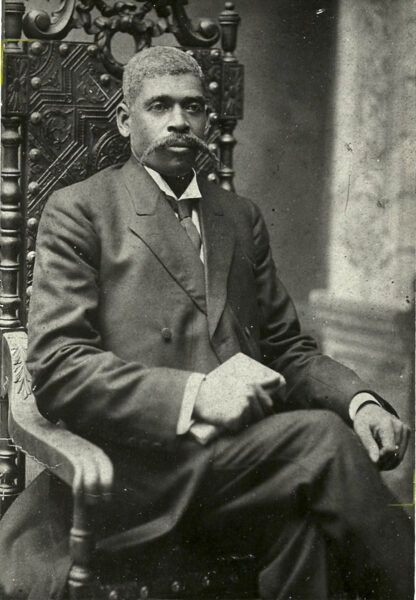
The Rev. Jacob Randolph Sr., Justin Reid’s great-great grandfather, enslaved as a child. (Credit: Justin Reid)
“Slavery was a moral ill. It was also a complex transnational economy, in which European heads of state, planters, and businesspeople pursued the institution as a form of security and profit. Richard Chew explains how capital expansion — and a British king’s fear of being beheaded — impacted the growth of slavery in the US colonies.
“Plantations in America’s South are physical testaments to the great wealth accrued through slave labor. Stephen Hanna says plantation museums often gloss over that economic history in favor of more romanticized depictions of plantation life.
“There’s little historical evidence that African Americans supported the Confederate cause by becoming soldiers. Yet this myth of the ‘black Confederate’ remains in circulation. Gabriel Reich studies the way collective memories of the Civil War are shaped and offers ways school curricula could address these problematic narratives.
“ ‘A Physical Place I Could Feel Rooted In’: A Virtual Tour of a Slave Dwelling. James Madison’s Montpelier recently hosted a National Summit on Slavery. They convened scholars, museum professionals, and members of descendant communities to talk about how historic sites can change the way slavery is taught and understood in America.” One of the people at the Montpelier summit was Justin Reid, Director of African American Programs at the Virginia Foundation for the Humanities, who in 2014 set out to find the Virginia plantation where his ancestors had been enslaved. And he found it. . . .”
Other stories as Black History Month came to a close:
- Stacy M. Brown, National Newspaper Publishers Association: New Interactive Website Featuring Henry Louis Gates, Tracks Slave Voyages
- Editorial, Omaha (Neb.) World-Herald: Recognition for Nellie Mae Webb’s legacy is a worthy request to the city
- Emil Guillermo, Asian American Legal Defense and Education Fund: My mom, International Women’s Day, and politicizing hate in America
- Leslie Harris and Lori Osborne, Chicago Sun-Times: Ida B. Wells vs. Frances Willard: Getting to the truth of a failure to fight racial injustice
- Tony Norman, Pittsburgh Post-Gazette: Black History Month 2019: The Audit — From Liam Neeson to Regina King — the highs and lows of Black History Month (March 1)
- S.I. Rosenbaum, Boston Globe: A shocking number of Jews have become willing collaborators in white supremacy (March 1)
- Valerie Russ, Philadelphia Inquirer: ‘It’s part of our history’: Storyteller leads walk exploring sites from Philly’s slave trade (March 2) [ON MY SCREEN: “by Valerie Russ, Updated: March 3, 2019” ]
- P.J. Thomas, Philadelphia Inquirer: My memories of traveling around the South in the 1950s look a lot like ‘Green Book’ (March 1)
- Kim M. Williamson, National Geographic: Explore the Underground Railroad’s ‘great central depot’ (Feb. 27)
Short Takes

Credit: Brian L. Frank/CatchLight Fellowship and Marshall Project)
- “In ‘Out of Bounds: Coming of Age in Gang Territory,’ Brian L. Frank takes an intimate look at the effect of targeted policing on minority youth in the Central Valley of California, where the children of agricultural workers and former factory workers have few opportunities,” David Gonzalez wrote in “Lens” blog essay Wednesday in the New York Times. “Coming from areas labeled ‘gang territory’ — a distinction largely reserved for communities of color — that have experienced generations of neglect and aggressive policing, many young people enter the system on ‘gang related’ charges as children. ” Above, inmates pray together. “Most prisons are racially segregated, so many inmates at the camp have never had friends from different ethnic backgrounds before arriving. . . .”
- The Dow Jones News Fund Monday launched a new video series promoting journalism careers and the critical role journalists play in American society, the fund announced. “The Fund slated the launch to coincide with Sunshine Week, recognizing the importance of open government and access to information for a free, robust media industry. The first video, ‘Journalists are Vital,’ features professionals offering their views about the future of journalism, why they love their jobs and why journalism is vital to a democracy. . . .” Linda Shockley, managing director, says, “Students, whether in high school or college, must be inspired to know that journalism is an honorable craft. It is vital to our democracy, plays an important role in our society and needs them now more than ever. . . .”
- “Cedar Attanasio, a multiformat journalist with international reporting experience, is joining The Associated Press to cover immigration from El Paso, Texas,” the AP reported on Thursday. The story also said, “Attanasio is a New Mexico native who speaks Spanish and Portuguese and is adept at video and still photography. He covered events surrounding the 2014 World Cup in Brazil as a freelance journalist and has worked for the Latin Times, Hearst Connecticut Media and the New York Post. . . . “
- “Reporting in profanity-laced Spanglish and calling herself La Gordiloca, which roughly translates as the Crazy Fat Lady, [Priscilla] Villarreal’s swift rise to prominence reflects how many people on the border now prefer to get their news — and just maybe, provides a glimpse at the future of journalism,” Simon Romero reported from Laredo, Texas, Sunday for the New York Times. “All the notoriety amounts to a big shift for Ms. Villarreal. Just a few years ago she was working part time for a wrecking crew removing scrap from tractor-trailer crash sites. She was struggling with depression and post-traumatic stress after losing a baby born prematurely. . . .”
- “After two well-reported and well-attended demonstrations and an ongoing social media campaign against Paramount Pictures in 2018 for having the worst record amongst the six major film studios in hiring Latinos in its workforce, the National Hispanic Media Coalition (NHMC) and the National Latino Media Council (NLMC) are declaring a historic victory in paving the way for achieving equality for Latino creatives and other people of color in Hollywood,” the two groups announced Monday by email. “On February 20, 2019, Paramount’s Chairman and CEO, Jim Gianopulos, announced the studio would boost its efforts to promote diversity and inclusion across storylines, vendors, shooting locations and crew. . . .”
- “NBC News said it would dispatch Al Roker, the veteran ‘Today’ weather correspondent, to the Arctic Circle to report on the effects of climate change,” Brian Steinberg reported Sunday from the SXSW Festival in Austin, Texas, for Variety. “He will be able to spotlight this issue and the dramatic impact of climate change in a way that I think will get more attention than a print piece in a publication with an unknown byline,” said Noah Oppenheim, president of NBC News. “Al is really passionate about that and we are happy to facilitate.”
To subscribe at no cost, please send an email to journal-isms+subscribe@groups.io and say who you are.
Facebook users: “Like” “Richard Prince’s Journal-isms” on Facebook.
Follow Richard Prince on Twitter @princeeditor
Richard Prince’s Journal-isms originates from Washington. It began in print before most of us knew what the internet was, and it would like to be referred to as a “column.” Any views expressed in the column are those of the person or organization quoted and not those of any other entity. Send tips, comments and concerns to Richard Prince at journal-isms+owner@
View previous columns (after Feb. 13, 2016).
View previous columns (before Feb. 13, 2016)
- Diversity’s Greatest Hits, 2018 (Jan. 4, 2019)
- Book Notes: Is Taking a Knee Really All That? (Dec. 20, 2018)
- Book Notes: Challenging ’45’ and Proudly Telling the Story (Dec. 18, 2018)
- Book Notes: Get Down With the Legends! (Dec. 11, 2018)
- Journalist Richard Prince w/Joe Madison (Sirius XM, April 18, 2018) (podcast)
- Richard Prince (journalist) (Wikipedia entry)
- February 2018 Podcast: Richard “Dick” Prince on the need for newsroom diversity (Gabriel Greschler, Student Press Law Center, Feb. 26, 2018)
- Diversity’s Greatest Hits, 2017 — Where Will They Take Us in the Year Ahead?
- Book Notes: Best Sellers, Uncovered Treasures, Overlooked History (Dec. 19, 2017)
- An advocate for diversity in the media is still pressing for representation, (Courtland Milloy, Washington Post, Nov. 28, 2017)
- Morgan Global Journalism Review: Journal-isms Journeys On (Aug. 31, 2017)
- Diversity’s Greatest Hits, 2016
- Book Notes: 16 Writers Dish About ‘Chelle,’ the First Lady
- Book Notes: From Coretta to Barack, and in Search of the Godfather
- Journal-isms’ Richard Prince Wants Your Ideas (FishbowlDC, Feb. 26, 2016)
- “JOURNAL-ISMS” IS LATEST TO BEAR BRUNT OF INDUSTRY’S ECONOMIC WOES (Feb. 19, 2016)
- Richard Prince with Charlayne Hunter-Gault, “PBS NewsHour,” “What stagnant diversity means for America’s newsrooms” (Dec. 15, 2015)
- Book Notes: Journalists Follow Their Passions
- Book Notes: Journalists Who Rocked Their World
- Book Notes: Hands Up! Read This!
- Book Notes: New Cosby Bio Looks Like a Best-Seller
- Journo-diversity advocate turns attention to Ezra Klein project (Erik Wemple, Washington Post, March 5, 2014)
When you shop @AmazonSmile, Amazon will make a donation to Journal-Isms Inc. https://t.co/OFkE3Gu0eK
— Richard Prince (@princeeditor) March 16, 2018

